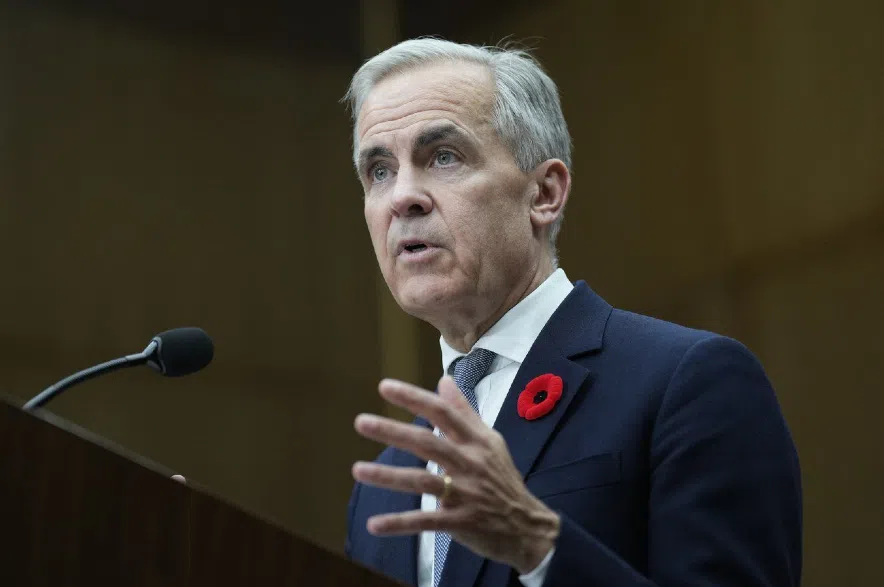By Sarah Ritchie
GYEONGJU — Prime Minister Mark Carney says Beijing doesn’t understand how seriously Canadians take issues of foreign interference, after raising them with Chinese President Xi Jinping.
“We had a discussion on foreign interference,” Carney told reporters Saturday before leaving the Asia Pacific Economic Cooperation (APEC) forum in Gyeongju, South Korea.
Read more:
- Sask. premier prepares for Indian yellow pea tariffs, speaks on China trade talks
- Saskatchewan farmer calls for open markets face of Chinese canola tariffs
- Tariffs & Saskatchewan: What do tariffs mean for you?
“I don’t think they recognize the level of concerns we have about these issues, but we manage these issues in Canada; we have a structure to manage them.”
The prime minister also referred to China as “the rising economic power.”
Carney and Xi met alongside top officials Friday for 40 minutes, in what was the first formal meeting between leaders of the two countries since 2017. Both characterized it as a turning point in the relationship.
A public inquiry in January pinpointed China as the top perpetrator of foreign interference targeting Canadian democratic institutions, and found Beijing tried to meddle in recent elections.
Carney said Canada’s strategy is to work together where there is common ground and respect one another’s differences, while defending Canadian interests.
He said he was not expecting progress at the meeting on his goal to get China to drop its tariffs on Canadian canola products, seafood and pork products, which came in retaliation for Ottawa’s 100 per cent tariffs on Chinese electric vehicles.
Carney instead said the meeting was “to establish that relationship at the highest level for the first time in eight years” in order to unlock eventual gains, which he suggested is how change is done “in that system.”
He suggested establishing an understanding of the trajectory of the bilateral relationship is “something you do in a relationship as opposed to a transaction,” and the best path for ironing out issues with China.
“People sometimes simplify it down, into ‘if you give this for that’ — that’s not the way it works,” Carney said, adding that without the Xi meeting, “there would not be progress on those issues.”
In earlier comments, Carney also said he apologized to U.S. President Donald Trump for an anti-tariff ad that has been blamed for ending trade talks with the United States.
Two of the most impacted provinces seem to accept that thinking.
Saskatchewan Premier Scott Moe said Friday the Xi-Carney meeting was a positive step forward, and it wouldn’t have been realistic for China to remove the tariffs during the meeting.
Manitoba Premier Wab Kinew said Friday the meeting was a good start and “exactly what we’ve been asking for.”
Carney also suggested he would not be revising the restrictions the Trudeau government had imposed on Chinese investments in Canada, such as in the telecommunications sector.
The prime minister said he was more interested in future decisions, noting there are “sensitive areas in terms of inbound investment.”
He said China and Canada can collaborate on “global solutions to climate change” and on finding stability amid changes in “the international monetary and financial system.”
Lessons seen in Blue Jays World Series bid
Carney said on Saturday there’s a lesson for Canada in the Toronto Blue Jays’ bid for a World Series title against the Los Angeles Dodgers.
Carney praised the Blue Jays for taking risks and staying aggressive against the defending champions.
He says “you don’t need the big payroll” and “you don’t need to be the big American team to win the World Series.”
The Jays haven’t taken home the pennant since 1993.
The seven-game series between the Blue Jays and Dodgers is tied 3-3, with the winner of tonight’s game taking home the World Series title.
When asked about the Blue Jays, Carney praised the team for its performance and willingness to take risks.
“It doesn’t always work out sometimes, you know — you put someone on the mound or you pinch hit or pinch run for somebody and it doesn’t work out but they take risk. They’re aggressive and they’re a team,” said Carney.
“Our Canada is taking risks and we are a team (and) we are Canada strong.”
Carney aims to transform economy
“We have to transform our economy,” Carney said at the closing of APEC on Saturday.
“Transform it from one of reliance on a single trade partner to one that’s more resilient to global shocks.”
The prime minister began the trip at the Association of Southeast Asian Nations summit in Malaysia last week with a plan to pitch Canada as a reliable trading partner and to encourage investment into what he calls nation-building projects at home.
He stopped in Singapore to speak with major investment firms about drumming up funding for Canada’s trade infrastructure, before meeting with various Asian leaders at the APEC summit.
Carney said Canada is working to secure free trade deals with Thailand and the Philippines, along with the wider ASEAN bloc, within a year. He also signed a defence and security partnership with South Korea, where he says Canada will send a trade mission next year.
“Opportunity comes from fundamentally changing how countries trade, how they partner, how they build, and the technologies that go with that,” Carney said.
“Asia is a region, like Canada, that’s at the forefront — at the coal face, if you will — of the global transformation that is gathering pace.”
Carney also announced that Canada has offered to host the APEC forum summit in 2029, which hasn’t been done since the 1997 summit in Vancouver.
Read more:











